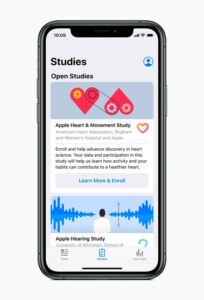ANN ARBOR, MICHIGAN —A University of Michigan researcher is teaming up with Apple to learn how noise exposure impacts hearing. Three new studies, available on the Research app later this fall, will explore new areas of medical research.
The Apple Hearing Study will be available to participate in through a new Apple app, called the Research app, which will be available for download later in 2019.
“We are excited about this unique opportunity to partner with Apple to determine how everyday activities affect our hearing. The information gleaned from this partnership will be critical for us to address the public health impact of various noise exposures on hearing loss in the United States.”
-F. DuBois Bowman, Dean of University of Michigan School of Public Health
Apple Hearing Health Study
The study will measure users’ level of sound exposure, says Rick Neitzel, an associate professor of environmental health sciences and global public health at the U-M School of Public Health, who will lead the work. The analysis of this data over time will help researchers understand how everyday sound exposure can impact hearing.
“This unique dataset will allow us to create something the United States has never had—national-level estimates of exposures to music and environmental sound. Collectively, this information will help give us a clearer picture of hearing health in America and will increase our knowledge about the impacts of our daily exposures to music and noise. We’ve never had a good tool to measure these exposures. It’s largely been guesswork, so to take that guesswork out of the equation is a huge step forward.”
–Rick Neitzel, PhD
How sound exposure impacts hearing health has not been well understood because researchers lack the tools to measure daily sound exposure over time. Researchers hope to use the capabilities and ubiquity of Apple products to conduct this large-scale study.
“Noise exposure is an emerging challenge that carries serious health implications for people worldwide,” said Rebecca Cunningham, U-M interim vice president for research. “The University of Michigan certainly cannot address this public health threat alone, which is why our partnership with Apple is so critical.
“These types of industry partnerships play a vital role in the overall health of our research enterprise, and by working together, researchers and industry leaders can help solve important issues facing our society.”
The study data will also be shared with the World Health Organization.
Source: UM, Apple ; featured image courtesy appleinsider









The effects of long term noise exposure of human ears on industrial sounds is well documented and understood as physical damage to the processing apparatus (cochlea) and the failure to control neurotransmitter values at the spiral ganglion fibers. The continued exposure of the ears to higher levels of amplification, as with the use of of hearing aids and recreational devices ensures progression of the neurosensory loss, which is mistaken for age related hearing loss.
There is absolutely no such thing as a natural age related hearing change. Neurons and nerve tracts have no life limits. Only nerve disease and protein changes (genetic) can alter the functions within our brains. Had there been age related changes, then hearing loss would be experienced by billions of people world wide, but that is certainly not the case.